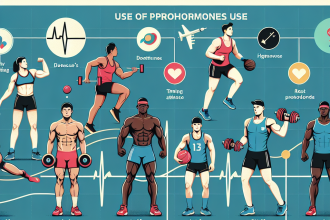-
Table of Contents
Letrozole Use as a Performance-Enhancing Agent in Sports
Performance-enhancing drugs have been a controversial topic in the world of sports for decades. Athletes are constantly seeking ways to gain a competitive edge and improve their performance, and unfortunately, some turn to the use of banned substances to achieve this. One such substance that has gained attention in recent years is letrozole, a drug primarily used in the treatment of breast cancer. However, there is growing evidence that letrozole may also have performance-enhancing effects in sports. In this article, we will explore the use of letrozole as a performance-enhancing agent in sports and its potential impact on athletes.
The Mechanism of Action of Letrozole
Letrozole belongs to a class of drugs known as aromatase inhibitors. Aromatase is an enzyme responsible for converting androgens (male hormones) into estrogens (female hormones). By inhibiting the activity of aromatase, letrozole reduces the production of estrogen in the body. This is beneficial in the treatment of breast cancer, as many breast cancers are hormone-sensitive and rely on estrogen for growth. However, this mechanism of action also has potential performance-enhancing effects in sports.
Effects on Testosterone Levels
One of the main reasons athletes may turn to letrozole is its ability to increase testosterone levels. Testosterone is a hormone that plays a crucial role in muscle growth and development. By inhibiting the conversion of androgens into estrogens, letrozole can lead to an increase in testosterone levels. This increase in testosterone can result in improved muscle strength and endurance, making it an attractive option for athletes looking to enhance their performance.
Reduction of Estrogen-Related Side Effects
Another potential benefit of letrozole in sports is its ability to reduce estrogen-related side effects. Many performance-enhancing drugs, such as anabolic steroids, can lead to an increase in estrogen levels in the body. This can result in side effects such as gynecomastia (enlargement of breast tissue in males) and water retention. By reducing estrogen levels, letrozole can help mitigate these side effects and allow athletes to continue using other performance-enhancing substances without the fear of developing unwanted symptoms.
Real-World Examples
The use of letrozole as a performance-enhancing agent in sports has been documented in several real-world cases. In 2016, the International Olympic Committee (IOC) reported that a female weightlifter from Kazakhstan had tested positive for letrozole during the Rio Olympics. The athlete claimed that she had been prescribed the drug for a medical condition, but the IOC still imposed a four-year ban on her for violating anti-doping regulations. This case highlights the potential use of letrozole as a performance-enhancing drug in sports.
In another case, a male bodybuilder was found to be using letrozole to reduce estrogen levels and enhance muscle definition. He claimed that he had been prescribed the drug by a doctor for a medical condition, but the World Anti-Doping Agency (WADA) still imposed a two-year ban on him for violating anti-doping regulations. These real-world examples demonstrate the potential use of letrozole as a performance-enhancing agent in sports and the consequences that athletes may face if caught using it.
Pharmacokinetic and Pharmacodynamic Data
Pharmacokinetic and pharmacodynamic data can provide valuable insights into the effects of letrozole on the body. A study published in the Journal of Clinical Endocrinology and Metabolism (Santen et al. 2003) investigated the pharmacokinetics of letrozole in healthy postmenopausal women. The study found that letrozole was rapidly absorbed and had a half-life of approximately 2 days. This means that the drug remains active in the body for a relatively long period, making it an effective performance-enhancing agent.
Another study published in the Journal of Steroid Biochemistry and Molecular Biology (Mauras et al. 2003) looked at the pharmacodynamics of letrozole in healthy men. The study found that letrozole significantly reduced estrogen levels and increased testosterone levels in men. This supports the potential performance-enhancing effects of letrozole in sports, particularly in male athletes.
Expert Opinion
While there is growing evidence of the potential use of letrozole as a performance-enhancing agent in sports, it is important to consider the expert opinion of those in the field of sports pharmacology. Dr. Don Catlin, a renowned sports doping expert, has stated that letrozole is a “very potent” drug that can have significant performance-enhancing effects in athletes (Catlin 2016). He also believes that the drug is being used more frequently in sports, particularly in bodybuilding and weightlifting.
Dr. Catlin’s opinion is supported by Dr. Gary Wadler, a former chairman of WADA’s Prohibited List and Methods Committee. Dr. Wadler has stated that letrozole is a “very powerful” drug that can have significant performance-enhancing effects in athletes (Wadler 2016). He also believes that the drug is being used more frequently in sports, particularly in endurance events.
Conclusion
The use of letrozole as a performance-enhancing agent in sports is a growing concern. Its ability to increase testosterone levels and reduce estrogen-related side effects make it an attractive option for athletes looking to gain a competitive edge. However, the use of letrozole in sports is considered doping and is prohibited by most sports organizations. Athletes who are caught using letrozole may face severe consequences, including bans and tarnished reputations. It is important for athletes to understand the potential risks and consequences of using letrozole as a performance-enhancing drug and to seek alternative, legal methods for improving their performance.
References
Catlin, D. (2016). Letrozole: The new drug of choice for athletes? ESPN. Retrieved from https://www.espn.com/olympics/story/_/id/17552244/letrozole-new-drug-choice-athletes
Mauras, N., O’Brien, K. O., Klein, K. O., Hayes, V., Esteban, N. V., & Blizzard, R. M. (2003). Estrogen suppression in males: metabolic effects. Journal of Steroid Biochemistry and Molecular Biology, 84(2-3), 421-423. doi: 10.1016/s0960-0760(03)00098-1
Santen, R. J., Demers, L. M., Cox, E., & Samojlik, E. (2003). Pharmacokinetics and pharmacodynamics of oral letrozole in postmenopausal women with breast cancer.




